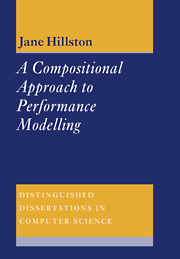Book contents
7 - Strong Bisimilarity
Published online by Cambridge University Press: 24 November 2009
Summary
Introduction
In this chapter we develop a strong bisimulation, based on the labelled multi-transition system for PEPA developed in Chapter 3, and examine some of its properties. The strong bisimulation relation aims to capture the idea that strongly bisimilar components are able to perform the same activities, resulting in derivatives that are themselves strongly bisimilar. In Section 7.2 we show how this property may be expressed in the definition of a strong bisimulation relation. Strong bisimilarity is then defined as the largest relation satisfying the conditions of a strong bisimulation relation.
The rest of the chapter is concerned with the properties exhibited by the strong bisimilarity relation, ∼. In Section 7.3 the relation is investigated from a process algebra perspective. In particular it is shown that strong bisimilarity is a congruence relation for PEPA. The implications of strong bisimilarity for the system components being modelled are discussed in Section 7.4. The relationship between strong bisimilarity and the underlying Markov process is examined in Section 7.5, as we investigate whether the partition induced by the relation forms a suitable basis for exact aggregation. This is found not to be the case.
Finally in Section 7.6 we suggest how strong bisimilarity may be used as a model simplification technique. The relation is used to find components which exhibit the same activities. These may then be subjected to a simple further test to ensure that the behaviours of the components are indeed the same.
- Type
- Chapter
- Information
- A Compositional Approach to Performance Modelling , pp. 97 - 112Publisher: Cambridge University PressPrint publication year: 1996



